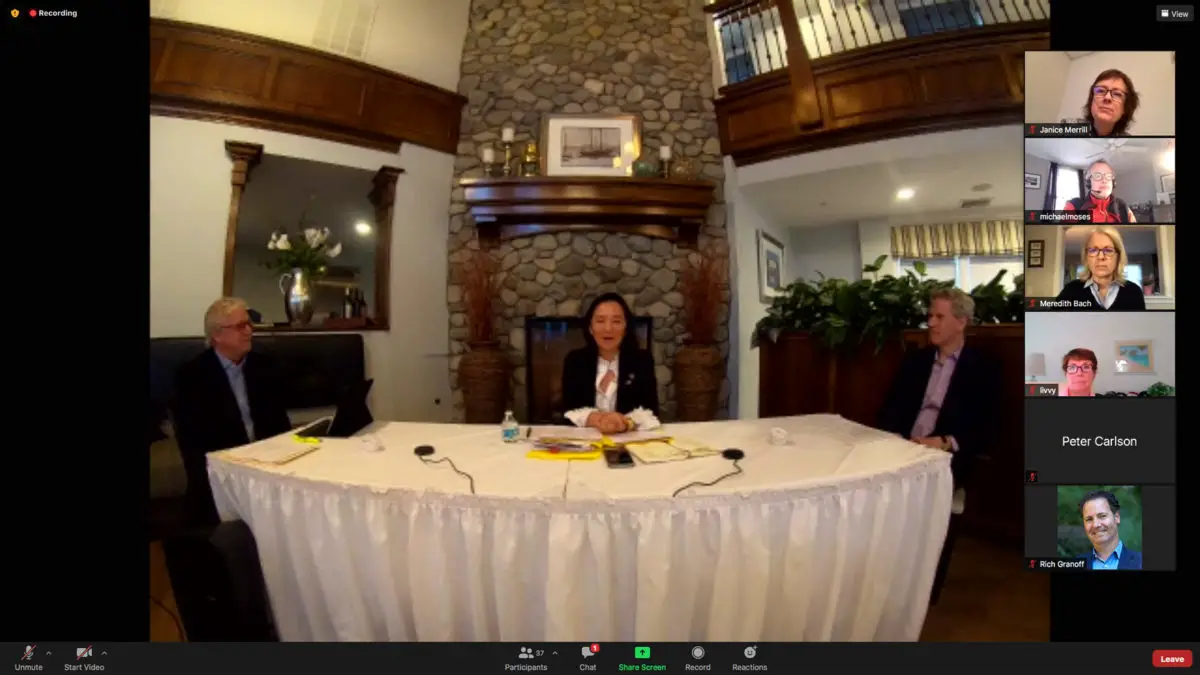State Rep. Fiorello calls for more transparency from ‘the ruling party’
A general lack of transparency on the part of her Democratic colleagues was the recurring theme during state Rep. Kimberly Fiorello”™s (R-Greenwich) April 1 appearance before the Greenwich Chamber of Commerce.
 Noting that the regular General Assembly session ends on June 9, Fiorello said the clock was already ticking on a number of measures, including controversial Senate Bill 1024, which as originally written essentially would have required municipalities to allow the construction of mixed-use developments with at least four apartments within a half-mile of transit stations (the transit-oriented development or TOD option) or a quarter-mile of commercial corridors, designated as “Main Streets” ”” without developers needing to seek approval from local planning and zoning.
Noting that the regular General Assembly session ends on June 9, Fiorello said the clock was already ticking on a number of measures, including controversial Senate Bill 1024, which as originally written essentially would have required municipalities to allow the construction of mixed-use developments with at least four apartments within a half-mile of transit stations (the transit-oriented development or TOD option) or a quarter-mile of commercial corridors, designated as “Main Streets” ”” without developers needing to seek approval from local planning and zoning.
The latter provision has been removed from the bill, which Fiorello called “wonderful news,” in that it will still allow municipalities to decide for themselves whether to follow the TOD/Main Street mandates.
Fiorello repeated her belief that the powers behind the bill “are saying local zoning officials are not doing a good job” when it comes to expanding affordable housing. “So many of us want to see life in Connecticut become more affordable,” she said.
However, Sara Bronin, founder and lead organizer of DesegregateCT, the group that has been pushing for passage of the legislation, said the fight was far from over at an April 1 press conference.
“We will work with legislators to restore provisions on transit-oriented development and small-scale multifamily housing, which are important for Connecticut”™s long-term growth,” Bronin said. “Bold, comprehensive and swift action on these issues is important to free Connecticut from a one-size-fits-all approach to housing.”
“We have seen great engagement on the issue of zoning reform so far this session and I am committed to continuing to work with all parties on these issues,” said state Rep. Cristin McCarthy-Vahey (D-Fairfield), co-chair of the Planning and Development Committee.
“Modernizing our zoning laws is critical to addressing our housing crisis, inequality and our state”™s long-term economic growth. I am confident that working together we will make progress this session.”
Also speaking in favor of the legislation were State Treasurer Shawn Wooden; Omena McCoy, senior policy adviser at the Connecticut Coalition to End Homelessness; and, by written statement, Senate President Bob Duff (D-Norwalk).
Meanwhile, Fiorello also spoke against the fact that a number of related bills ended up spread across various committees, from housing to planning and development to transportation. The various proposals by what she called “The ruling party” ”” in addition to Gov. Ned Lamont, Democrats hold a 24-12 majority in the state Senate and a 97-54 plurality in the House ”” “are not bad ideas, they could be really valid ideas, (but) do they have to be mandates?”
Fiorello also opposes another contentious proposal, the so-called “mansion tax” put forward by Senate President Pro Tempore Martin Looney (D-New Haven), which would require those who own a house whose market value is at least $430,000 to pay one extra “mill” ”” $1 for every $1,000 of assessed value ”” in property taxes each year.
She approvingly noted that Lamont has signaled he would not support such a bill if it was passed by the General Assembly.
Fiorello slightly broke with her fellow Republicans when it came to support for the governor”™s Senate Bill 888, which would allow adults 21 and older to possess up to 1.5 ounces of cannabis and purchase products from licensed stores, which could open as early as May 2022.
While state Senate Republican Leader Kevin Kelly (R-Stratford) has objected to the idea of legalizing recreational cannabis, Fiorello said her concern was one of social equity, saying that the bill”™s failure to include homegrown marijuana leaves potential entrepreneurs from disadvantaged communities in the cold.
She did, however, acknowledge that various police chiefs, parents, teachers and doctors have voiced opposition to legalizing recreational marijuana.
A question from the online audience about whether the state has enough money to pay for making the aforementioned bills ”” not to mention continuing to draw residents and companies here from other states, as has been the case throughout the pandemic ”” brought an intriguing answer.
“The feeling in the legislature is that money is not an issue,” Fiorello said. “The revenues to the state have been pretty good through Covid.
“There”™s really no concern over how much these ideas will cost,” she added.